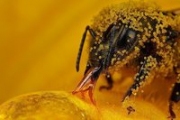Viewings: 6870

Recently a group of American biologists have discovered that the bees pollinate the plants where the best, if you are surrounded by other pollinators. In the presence of these competitors productivity collectors can grow twice! So for our gardens and meadows flourished, you need to provide them the most diverse set of neighbors.
As we remember, Winnie the Pooh thought that bees are on earth in order to make honey. However hairy tooth was a mistake - in fact, these hardworking insects first need to pollinate the plants. Among their relatives from the order Hymenoptera (Hymenoptera) they are considered the best pollinators. Judge for yourself - in search of plants to collect pollen and nectar bees can be removed from the nest at a distance of three to five miles!
In addition, it is estimated that each bee per day visited by about 100-150 flowers. Well, if you consider that usually work flies to 20 thousand bees, it turns out that they can pollinate to 60-80 thousand flowers during daylight hours. Such performance is a record not only among all Hymenoptera, but among all of pollinators.
While bees have another interesting feature - although they are not tied to a specific species, but each of harvesters only works on the colors of a particular type until they wither away. So, if someone from the bees in the morning first caught flower buckwheat, it in a few days to fly only on these plants, and when the buckwheat fade, only then will switch to the other. You understand that such behavior will greatly enhance the effectiveness of pollination.
Several times scientists from different countries made experiments - using pollen, marked with radioactive isotopes, they counted how many flowers at a specific site are pollinated by bees, and how many other insects. Interestingly, studies conducted in different regions revealed similar results: the share of bees fell 80 percent to 90 percent of pollinated plants. Because of this, not only among ordinary people, but in the scientific environment has spread the myth about the indispensability of bees, which is best reflected in funny cartoon Bee Movie (in the Russian hire: "Bee Movie: Honey conspiracy").
This myth is "apocalyptic" variations. So, many publications seriously argue that if disappear bees, on the planet comes ecosystem crisis, because the plants will be no one to pollinate and they will not be able to reproduce (as, actually, and it was shown in the above animation). However, about the weaknesses of this version Voice" already wrote in the article "Followed by bees and people die?"), so let's not dwell on how it is incorrect and simply ignorant. Much more interesting - and how correct were these experiments?
We have to admit that, unfortunately, these experiences as such cannot be considered as not held, the control experiment, the scientists did not consider the activity of wild pollinators in the absence of bees. That is, in this case we were dealing with a normal competitive displacement: if in the area live bees, they, as a more efficient collectors, have time to visit much more plants and, accordingly, to pollinate them. However, when they are not present, the plant does not perished from "unrequited love" - the bees, butterflies, wasps, flies and other insects perfectly coped with "imposed" on them the task of pollination. After all, when no competition, their activity was increased in several times.
Recently a group of biologists from the University of California at Davis (USA) has discovered one more interesting thing there is, by bees pollinating plants is much better if you are surrounded by other pollinators. Entomologists have conducted a series of experiments - at first they studied the effectiveness of pollination by bees from one family flowers almond trees, dissolving with experimental plot all other lovers of pollen and nectar. Next, they occupied the land representatives of some species of wild pollinators and watched the changing productivity of bees.
The results showed that if the bees worked side by side with bumblebees (Bombus), halictidae (Halictidae), bee-carpenters (Xylocopinae) and omiyi (Osmia), their performance has been increased by 50 percent! The next moths and flies such growth of activity of bees did not give " in their bees increased productivity of only 15-20 percent. Apparently, this was because the bees are not considered them serious competitors, unlike their Hymenoptera relatives.
So, as you see, in this case it turned out that bees necessary competitor in order to work better. However, the researchers did not understand how the pickers find his presence. There were many different versions: bees can feel pheromones emitted by rivals, to hear a buzz or just seeing strangers. It is also possible that actually collectors use comprehensive information and visual, auditory, and olfactory.
Interestingly, this study reveals another myth is that to improve the efficiency of bees should delete all potential rivals. Apparently, he appeared on the analogy of weeds with plant - when the weeds, plants will grow better. The most interesting is that many beekeepers carry out such actions in practice - they destroy near their apiaries nests of bees, Halitov and other competitors, arguing that now they would get more honey. But everything is exactly the opposite - in the absence of rivals bees begin to be lazy, visit fewer colors and therefore generate less nectar and pollen.
So, for your gardens and meadows flourished, you need to provide the bees that pollinate, a diverse set of neighbors. Yeah and honey in the end you will get more. This example highlights how important it is to maintain the high biodiversity of our planet - even from a purely practical problems...
















